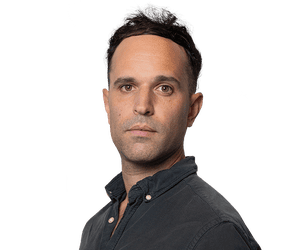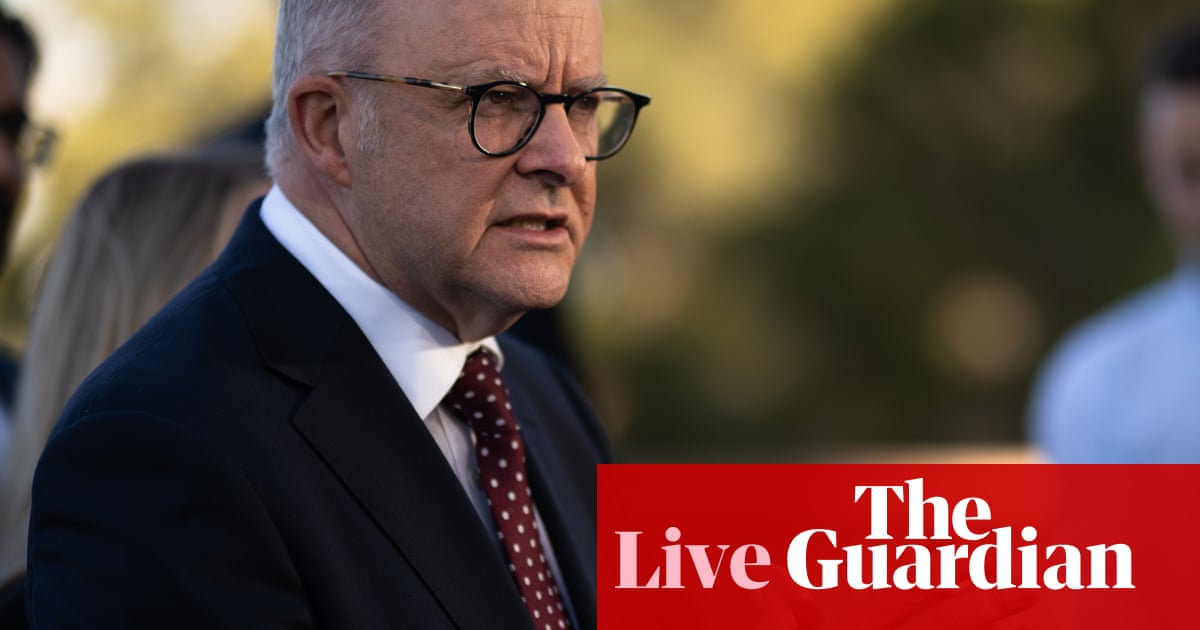Russia’s sentencing of Australian Oscar Jenkins a ‘sham trial’ – Watt

Dan Jervis-Bardy
Just taking a step back for a minute to the interview with Labor senator Murray Watt.
The frontbencher was asked for his response to news Oscar Jenkins has been sentenced to 13 years in prison in Russia for fighting alongside Ukrainian forces.
Watt said:
This is an appalling decision from Russia, and another outrage in a long line of outrages when it comes to matters involving Ukraine. We are appalled by this decision from Russia. We consider this to be a sham trial, and we don’t accept that Mr Jenkins should be treated this way. In our view, he should be treated as a prisoner of war.
Key events
Burns could push glossy black cockatoos towards extinction in Victoria
Glossy black cockatoos could be pushed towards extinction in Victoria if planned burns of 13,000 hectares of forest go ahead, ecologists and conservationists warn.
The Victorian government is being urged to abandon the burn, which is intended to reduce bushfire risk.
Glossy black cockatoos are listed as vulnerable in Victoria, where they are found only in East Gippsland.
Nearly two-thirds (64%) of their Victorian habitat was burned in the 2019-20 black summer bushfires, leaving the species almost entirely dependent on 48,000 hectares of unburnt coastal forest between Lake Tyers and Orbost, about 350km east of Melbourne.
A peer-reviewed study published in the journal Australian Field Ornithology estimated that the Victorian population had declined by three-quarters since the fires.
Glossy black cockatoos feed almost exclusively on the cones of black sheoak trees.
For more on this story, read the full report by Guardian Australia’s Petra Stock:
Urgent action needed to tackle NSW waste and recycling crisis

Lisa Cox
The NSW government says urgent action is needed to tackle the state’s “waste and recycling crisis” or red bins will not be able to be collected in Sydney and some parts of regional NSW by 2030.
The Minns government released a waste and circular infrastructure plan this week that it says is needed because greater Sydney is running out of landfill.
The plan considers:
-
“streamlining” planning processes to expand or extend the life of some landfills
-
strategies to increase recycling rates that have flatlined at an average of 65% of waste generated across the state
-
how to better plan recycling and waste infrastructure
-
further exploration of waste-to-energy options where doing so would reduce reliance on landfill and maintain human health and environmental protections
The environment minister, Penny Sharpe, said failure to tackle the problem would drive up the cost of kerbside bin collections and could affect critical infrastructure projects such as new housing developments.
The government has taken some early steps, with the parliament earlier this year passing laws to mandate food organics and garden organics recycling.
Sharpe said for too long state governments “have ignored the fact that greater Sydney is running out of landfill”.
Waste collection is an essential service. This draft plan is the first of its kind and is long overdue. We can no longer kick this problem down the road.
The first chapter of the plan is out for public consultation until 25 June. Future chapters will be released later this year.
Surge in refusals for freedom of information undermines trust in Australian government, watchdog warns
The Australian government is refusing freedom of information requests at a rate not seen for a decade, data shows, prompting concerns for transparency and accountability.
Data held by the Office of the Australian Information Commissioner, the watchdog overseeing the FoI system, revealed the proportion of FoI requests being completely refused has shot up to 27% in the December 2024 quarter.
That is the highest level since at least 2014-15, historical records show.
The OAIC said it is aware of the rising refusal rate and is monitoring the situation.
“There are some clear opportunities for improvement for the commonwealth FoI system that we are alive to as the regulator and monitoring,” a spokesperson said. “This includes refusal rates.”
The fast-rising refusal rate has prompted concern among transparency advocates.
For more on this story, read the full report by Guardian Australia’s Christopher Knaus:
Alarming rates of abuse in Queensland’s child safety system prompt inquiry

Ben Smee
The Queensland government has announced an inquiry into the state’s child safety system, following the release of a report that has found alarming rates of abuse and neglect.
It says the results of a 2024 “census” of about 3,000 children in state care found that more than one in 10 had been sexually abused; and almost half had been physically abused.
Most children said they had suffered emotional abuse (83%), neglect (88%) and been exposed to domestic violence (68%). More than two-thirds had experienced three or more types of abuse.
Tom Allsop, the chief executive of PeakCare – the umbrella group for child and family services – welcomed the inquiry but said the problems and their solutions were already well known.
Allsop said there had been a “crippling over-reliance” on residential care homes, resulting from decades of under-investment in prevention, early intervention, and a lack of contemporary approaches.
We have never known more about what is needed to keep children safe, to prevent harm, and how best to respond when harm does occur.
I’m confident it will quickly become clear that the challenges in Queensland are not a result of the absence of knowing what is needed to create a better care system, it is an enduring and entrenched lack of meaningful action on the things we know will make the biggest difference.
The government has appointed Paul Anastassiou KC to lead the inquiry and says it will have broad terms of reference.
The premier, David Crisafulli, said:
This is the commission of inquiry the state must have if we are serious about the safety of Queensland children and our communities.
Reforming the state’s broken child safety system is critical, and we will take the steps others have been afraid to take because it is the right thing to do.
Ted O’Brien says Liberals need to reflect ‘modern Australia’ with more women in party
Ted O’Brien says the Liberal party needs to expand to better reflect modern Australia, pledging to recruit more women and young people to help shape policy and stand for parliament.
As the Coalition begins the long road back from the 3 May election defeat under Peter Dutton, the new deputy Liberal party leader and his leader, Sussan Ley, face calls for formal quotas to help women take winnable seats, and for a major policy reset to better align with voters’ concerns.
The Fairfax MP and nuclear power advocate told Guardian Australia he would contribute to policy debate on energy supply, but stopped short of saying whether the Dutton-era plan for construction of seven reactors should remain policy for the next election, due around 2028.
I absolutely believe that we need to see a bigger Liberal party which reflects modern Australia, and represents modern Australia, and that includes more women, not just running as parliamentarians but throughout the party.
I’m saddened by the fact that we had 28 female candidates, that 28 women went to this election as Liberals who weren’t elected.
Asked about Dutton labelling the ABC and Guardian Australia “hate media” in the days before the election, O’Brien promised a different approach.
I don’t believe in prejudging any media outlet.
I think that we need to be speaking to all Australians because the Liberal party represents all Australians, and different media outlets sometimes speak to different parts of Australia.
For more on this story, read the full report by Guardian Australia’s Tom McIlroy:
Victoria announces free public transport for under-18s
Every Victorian child will get free public transport from 1 January next year, the state government has pledged.
A new youth Myki, valid across the state, will save families up to $755 a year (the cost of a yearly student pass) under the scheme. Anyone under 18 in non-Myki areas will also be eligible to travel for free.
The benefit will apply to all forms of public transport, including trams, trains, buses and coach services.
The premier, Jacinta Allan, said it meant “free public transport for every child, every day, everywhere”.
“Families are doing it tough and I’m on their side,” she said.
The government says more than 1 million children and their families will benefit. The program will cost $318m over four years.
For more on this story, read the full report from Guardian Australia’s Tory Shepherd:
PM to meet world leaders in Rome for Pope Leo’s inauguration
Anthony Albanese will represent Australia at Pope Leo XIV’s inauguration mass, which will draw together a rare concentration of world leaders and royalty.
The prime minister is expected to hold talks with other leaders as a hive of diplomatic activity is expected to play out on the sidelines of the historic event.
Since arriving in Rome on Friday, Albanese has met with the Sydney Catholic Archbishop, Anthony Fisher, and the Melbourne Archbishop, Peter Comensoli, Nine newspapers reported.
The prime minister also spoke briefly about the importance of the inauguration mass for Australia’s 5 million Catholics at a church in Rome that welcomes visiting Australians.
It’s a whirlwind two-and-a-half-day visit and one the recently re-elected prime minister will be sure to use in advancing Australia’s domestic and foreign policy agenda.
Although official itineraries have not been released, Albanese is expected to meet with the Canadian prime minister, Mark Carney, and the EU chief, Ursula von der Leyen.
At the top of the agenda for both meetings will be trade and the war in Ukraine.
Other notable attendees include the Ukrainian president, Volodymyr Zelenskyy, the US vice-president, JD Vance, who is set to represent the US in place of Donald Trump, and Britain’s Prince William.
The mass, expected to be attended by tens of thousands of people in St Peter’s Square, will begin at 10am local time (6pm on Sunday AEST). It is expected to follow a visit by the Pope to St Peter’s tomb in the basilica.
– AAP
Ruston says she is open to the introduction of quotas for women in the Liberal party after the disastrous election result, saying “nothing is off the table”.
I think our policy offerings need to reflect the feedback that we get more broadly across Australia.
Ruston asked AI why Liberals lost – and ‘no clear theme’ emerged
After the disastrous 2025 election result for the Coalition, Ruston says she asked an “off the shelf” large-language model, commonly referred to as AI, what people thought about the party and the election results, and that the result returned “no clear theme”.
Actually more than anything, it showed me that there were so many different issues that Australians were considering when they went to the ballot box to vote that I think it shows us we absolutely have to look at everything. There was no clear theme apart from quite clearly the Australian public went to the ballot box and didn’t vote for us.
The senator continued:
Basically, it said that the product offer that we took to the Australian public, Australians did not support quite clearly and we need to go back to the drawing board and have a look at all of the issues that factored into it. Many issues have been ventilated over the last two weeks by colleagues, by commentators and every single one of them deserved to be considered.
Ruston was also quick to add that the party won’t be relying entirely on AI to conduct its post-election review.
There are many ways that we need to address this. We need to speak to our party members, we need to speak to the frontbench and the backbench. We need to make sure the backbench is included in the process of going forward. We need to speak to the Australian public.
But obviously, technology gives us an opportunity to be able to collate the broader commentary across Australia that something we probably haven’t had access to before and we should use that as well. Every tool that’s available should be used.
Climate policy to be left to shadow ministry – Ruston
Asked about ongoing negotiations on the Coalition agreement between the Liberal and National parties, Ruston says the talks are under way.
Ruston says it is her preference that the Coalition’s attitude towards climate change and the Paris agreement, and the future of nuclear, should be left to the shadow ministry to hash out.
Liberal party policy is developed in the Liberal party room. National party policy is delivered in the Nationals party room and Coalition policy is designed or is agreed to around the shadow cabinet table. So a Coalition shadow cabinet will be the one that will put forward Coalition policy. But we should never shy away from the fact that we have got two separate party rooms that go through policy processes separately.
Asked whether she will stay in the Coalition, the senator says “I certainly hope so”.
Liberals ‘work best’ when they’re a broad church – Ruston
Ruston is also asked about a decision by the South Australian Liberals to place Alex Antic, a member of the party’s factional right who has been consolidating power within the state by courting religious groups in particular, ahead of her on the Senate ticket.
Ruston:
Well, obviously that’s a decision for the party members here in South Australia. What I’m excited about is now having been hopefully re-elected to the parliament for another six years to play my role as part of the team, part of the leadership team, because I’m really excited about the opportunity to rebuild our party.
On the takeover by the conservatives in South Australia:
Well, look, as I said, we’re a broad church. That’s where we work best when we’re tolerant of the broad range of views that we have, but our values are all the same. I mean, I don’t think anybody in my party doesn’t mean that aspiration is the most important thing we should strive to be able to enable every Australian to be able to achieve.
Ruston not ruling in or out Liberals’ support for Aukus
Ruston has also demurred on the question of whether the party will review its support for Aukus, saying she is “not going to rule in, rule out”.
Quite clearly that is a very, very important policy position that has been adopted by both sides of the parliament – in fact, both the Labor party and the Coalition. I think it stands in very strong stead in very uncertain times. But it’s not for me to be ruling in, ruling out. The leaders made it very clear, I think you can read from what I have just said, I think we could consider Aukus a very strong platform in our policy rebuild.
On health policy, Ruston says she wishes “the Labor party well to make sure their policies are implemented so Australians can afford to go and see a doctor” but is “not ruling anything in or out” on whether the Coalition would help pass Labor’s reforms.
On abortion, Ruston says the issue is “something that’s well and truly in the domain of the states and territories and should stay there”, and she is not aware of any proposal that would “make any changes in relation to the small amount of responsibility that the federal parliament has for this issue”.

